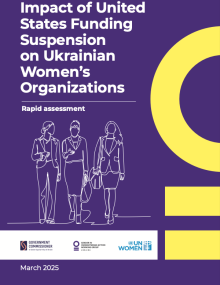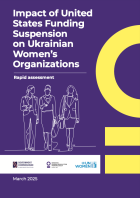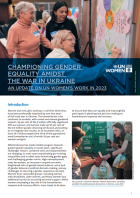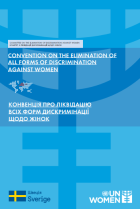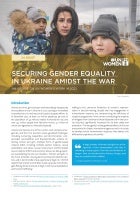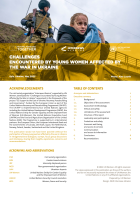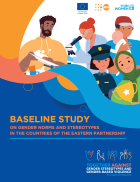1 - 19 of 19 Results
Date:
Women-led and women’s rights organizations (WROs) in Ukraine have been severely impacted by funding suspensions by the United States (U.S), a new survey by UN Women, the Apparatus of the Government Commissioner for Gender Equality Policy of Ukraine, and the Gender in Humanitarian Action Working Group, reveals.
UN Women calls for more direct, flexible, and long-term funding to women’s rights organizations to ensure life-saving programs for women and girls to meet sudden funding gaps.
Date:
Women and men, girls and boys, in all their diversities, have been profoundly impacted by over two years of full-scale war in Ukraine. The humanitarian crisis continues to escalate, with varied and uneven gendered impacts. 56 per cent of the 3.7 million officially registered IDPs are women, and women make up 93 per cent of the 4.6 million people returning to Ukraine and seeking to re-integrate into society. As of December 2023, at least 14.5 million people (one-third of the population) need humanitarian aid, of which 56 per cent are women and girls.
Date:
Policy Brief: A Gender Responsive Recovery for Ukraine: Introduction
Date:
The Concluding Observations include recommendations to Ukraine to enhance implementation and protection of the rights of women and girls, including living in affected by war in Ukraine areas and internally displaced women, access to justice, education, health care, employment, economic and social benefits.
Date:
Women and men, girls and boys have been deeply impacted by the escalation of war in Ukraine in 2022, causing an immediate humanitarian crisis and massive disruption to peace efforts. Ukraine has become one of the world’s most complex emergencies, and the crisis presents severe gendered challenges, including worsening inequalities and discrimination, compounded vulnerabilities and disproportionate violence affecting women and girls.
Date:
This study generates research and evidence on needs and priorities of young women affected by war broken out as a result of the Russian full-scale invasion of Ukraine on 24 February 2022. It is aimed at facilitating advocacy initiatives for young women to voice their concerns and demands. The study is developed by UN Women Ukraine together with NGO Internews Ukraine.
Date:
This publication presents data and insights about the perceptions of male and female roles in society, employment and leadership, household and family, gender-based violence, sexual relationships and reproductive health in the Eastern Partnership countries and provides recommendations for future programming.
Date:
The UN Development Programme in collaboration with UN Women and UN Food and Agriculture Organization led the socio-economic assessment of the impact on businesses and households in Ukraine. This report presents an assessment of the social and economic impacts of the COVID-19 crisis on Ukraine, with a focus on those groups which are, or have become vulnerable due to the pandemic, as well as the impact on micro, small and medium enterprises.
Date:
The spread of the COVID-19 pandemic and the related restrictive measures exposes all groups of women to higher risks of losing incomes and savings, it significantly increases the burden of unpaid care work, exposes women and children to domestic violence and exacerbates vulnerabilities of those facing multiple forms of discrimination, reveals the new study developed by UN Women Ukraine.
Date:
Following the principle "Nothing about us, without us," this study aims to better understand the capacity of women's organisations in Ukraine as the first step to improving assistance on the promotion of gender equality and women's empowerment. It is designed to create a baseline against which to measure future capacity development efforts. These findings can be used by the civil society, the government stakeholders and the donor community in their planning, coordination and capacity building initiatives.
Date:
The evaluation looks into the gender responsiveness and impact of policy design, implementation and monitoring and reviews alignment with the national policies promoting gender equality. The findings of the evaluation lessons will inform the development of the next post-2020 Roma strategy and action plan in accordance with the European and international standards, as well as the relevant national legal and policy frameworks, particularly those on human rights and gender equality.
Date:
‘Invisible Battalion 2.0’: Women Veterans Returning to Peaceful Life” is a participatory and evidence-based study that summarizes the legal and normative frameworks guaranteeing women veterans’ peaceful reintegration into civil life in Ukraine. It illustrates how women veterans are using the services offered by the Government of Ukraine to enable their reintegration, and the challenges thereof, and proposes a roadmap to strengthen women veterans’ access to services for quality post-military lives, and how they can be better served based on these insights.
Date:
This brochure is a collection of interviews and short biographies of the 25 nominees of the Women in Arts 2019 Award. Among them are outstanding female painters, sculptors, composers, performers, film directors, actresses, screenwriters, writers, poets, curators of cultural projects and art managers who share their experiences as women working in the arts.
Date:
Guidelines for Gender and Conflict-sensitive reporting provide a practical guide for the media to present an accurate portrait of men and women, the world and its possibilities, as well as integrating a gender lens into conflict reporting that involves respecting the key standards of journalistic professionalism which impartially presents verified information in a fair and balanced context, gives voice to marginalised actors, and shuns gender stereotypes.
Date:
The Guide supports key stakeholders to help facilitate the full inclusion and meaningful participation of women and girls with disabilities. It aims to assist in understanding of the intersectionality of human rights and provides practical recommendations for the implementation and monitoring of two key Conventions: the UN Convention on the Elimination of All Forms of Discrimination against Women (CEDAW) and the Convention on the Rights of Persons with Disabilities (CRPD).
Date:
Human Rights of LBTIQ Women in Ukraine provides an overview of the UN and national human rights instruments on the rights of LBTIQ women and a summary of the situation with respect to their rights in Ukraine. The publication aims to support the civil society activists advocating for the integration of LBTIQ rights into Ukrainian legislation and policies.
Date:
The CEDAW-based Legal Review: A Brief Guide was developed to guide practitioners in the government, parliament, civil society and women’s groups, academic institutions, and development agencies to assess compliance of the national laws with the Convention on the Elimination of All Forms of Discrimination against Women (CEDAW). It enables the practioners to provide appropriate recommendations for ensuring that new and existng laws are compatible through a CEDAW-based legal review.
Date:
Gender Accessibility Audit Toolkit helps practitioners and civil society identify infrastructural and communication barriers that prevent women and girls with disabilities from fully exercising their human rights. The toolkit can be used by local governments and service providers in inclusive local planning, budgeting, and provision of services. It can also guide representatives of civil society, gender equality and disability rights advocates, as well as women and men with disabilities to advocate for the elimination of identified barriers.
Date:
The brochure “The Rights of Roma Women in Ukraine: Overview on the Situation of Roma Women in Ukraine in the Context of the Implementation of CEDAW” provides an assessment of the state of human rights of Roma women in Ukraine and the analysis of how the implementation of the Convention on the Elimination of Forms of Discrimination against Women (CEDAW) addresses their rights.
